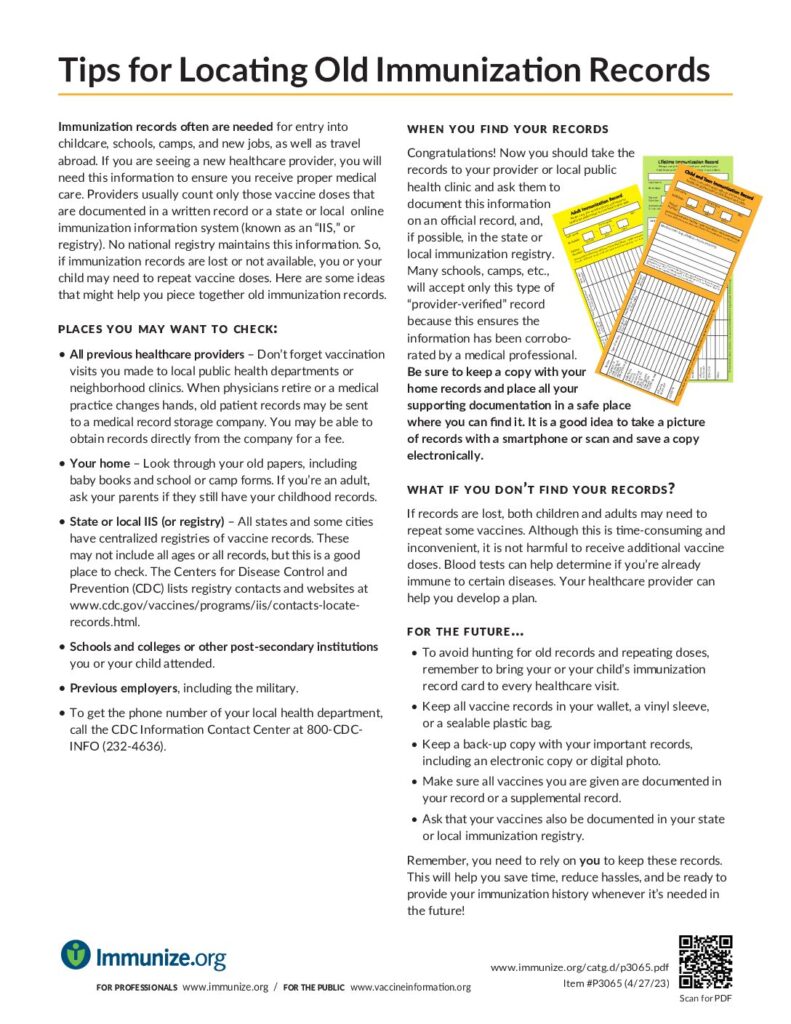Immunization records often are needed for entry into child care, kindergarten, school, summer camp, and college or other post-high school training, as well as for future employment and international travel. If you are seeing a new healthcare provider, you will need this information to ensure you receive proper medical care. Providers should count only those vaccine doses that are documented on a written record or available on a local computerized immunization information system (registry).
Unfortunately, no national organization maintains this information. So, if immunization records are lost or not available, you or your child may have to repeat vaccine doses. Piecing together old immunization information can be difficult and time-consuming. Here are some ideas that might help you reconstruct this information.
Places to Check
Don’t forget the vaccination visits you made to local public health departments or neighborhood clinics. Sometimes when physicians retire or a medical practice changes hands, old patient records are sent to a medical record storage company. You may be able to obtain records directly from the company, but you may have to pay a fee.
Look through your old papers, including baby books and school or camp forms. If you’re an adult, don’t forget to ask your mother or father if they still have your childhood records.
Schools you or your child attended.
Check with previous employers, including the military.
All states and a few cities have centralized registries of vaccines given by local providers (also called immunization information systems, or IIS). A registry may not have all the records, but this is a great place to check. Some resources:
- CDC has a listing of contacts for IIS immunization records
- Call your local health department
- Visit your state immunization program website
When You Find Your Records
Congratulations! Now you should take the records you have found to your provider or local public health clinic and ask them to document this information on an official record, and, if possible, in the state or local immunization information system. Many schools, camps, etc., will accept only this type of “provider-verified” record because this ensures the information has been evaluated and corroborated by a medical professional. Be sure to keep a copy of these records with your other home records and place all your supporting documentation in a safe place where you can find it. It’s wise to take a digital photo of your records so you have an electronic copy, as well.
What If You Don’t Find Your Records?
In general, both children and adults will need to repeat some vaccines. Although this is time-consuming and inconvenient, it is not harmful to receive additional vaccine doses. For a few vaccines, blood tests can help determine if you’re already immune to certain diseases. Your healthcare provider can help you determine exactly what’s best for you.
For the Future
- To avoid hunting for old records and possibly repeating undocumented vaccinations, remember to bring your or your child’s immunization record card to EVERY medical appointment.
- Keep your record in your wallet, a vinyl sleeve, or a sealable plastic bag. Take a digital photo each time you update it. It is also a good idea to keep a backup copy where you store your important papers.
- Make sure all vaccines you are given are documented on this card or a supplemental record.
- Ask that your vaccines also be documented in your state or local immunization registry.
Remember, you need to rely on YOU to keep these records. This will help you save time, reduce hassles, and be ready to provide your immunization history whenever it’s needed in the future!
Source: Tips for Locating Old Immunization Records from Immunize.org.
More Information From CDC
The Vaccination Records: Finding, Interpreting, and Recording
Vaccination records (sometimes called immunization records) provide a history of all the vaccines you or your child received. This record may be required for certain jobs, travel abroad, or school registration
